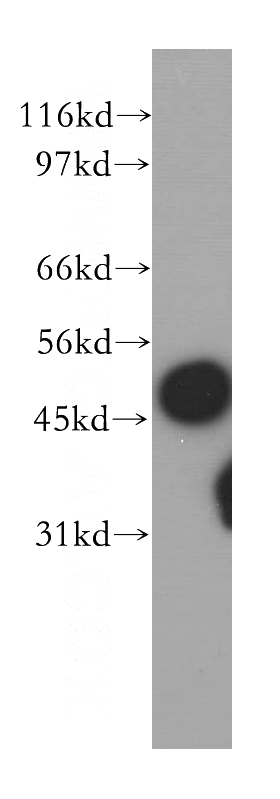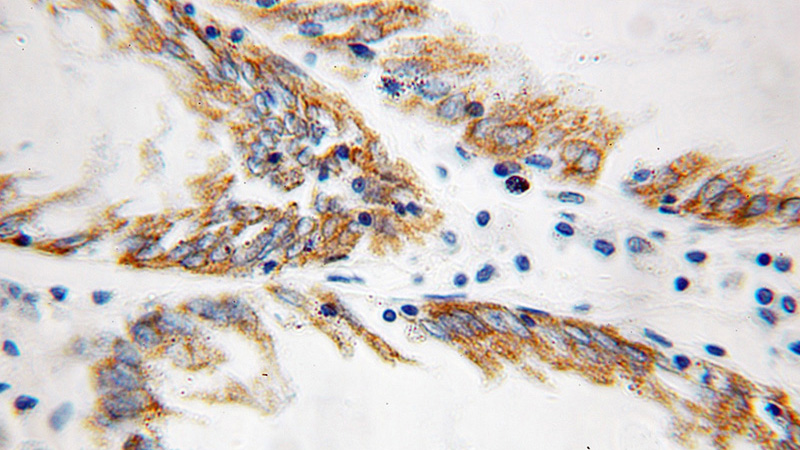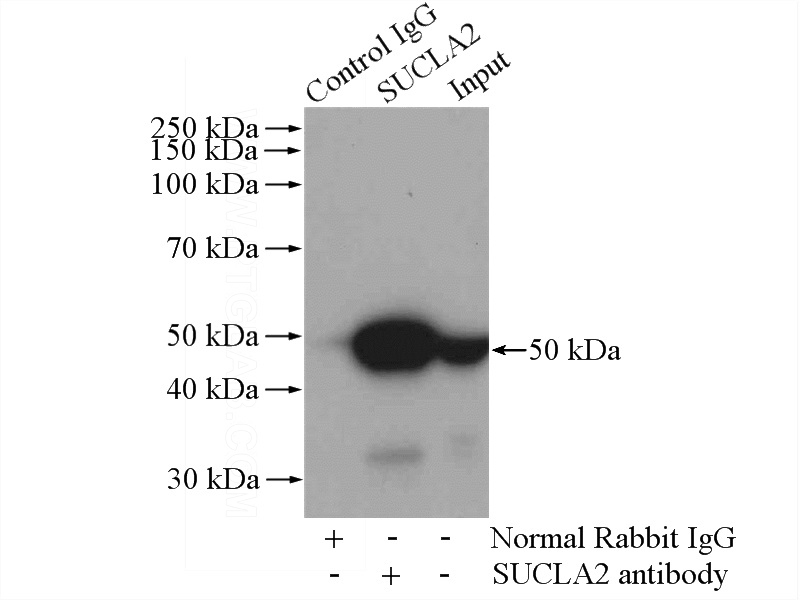-
Product Name
SUCLA2 antibody
- Documents
-
Description
SUCLA2 Rabbit Polyclonal antibody. Positive IHC detected in human colon cancer tissue, human heart tissue, human kidney tissue. Positive WB detected in PC-3 cells, HEK-293 cells, HepG2 cells, L02 cells, mouse brain tissue, mouse liver tissue, SH-SY5Y cells. Positive IP detected in HEK-293 cells. Observed molecular weight by Western-blot: 48-50 kDa
-
Tested applications
ELISA, WB, IHC, IP
-
Species reactivity
Human,Mouse,Rat; other species not tested.
-
Alternative names
A BETA antibody; SCS betaA antibody; SUCLA2 antibody
-
Isotype
Rabbit IgG
-
Preparation
This antibody was obtained by immunization of SUCLA2 recombinant protein (Accession Number: NM_003850). Purification method: Antigen affinity purified.
-
Clonality
Polyclonal
-
Formulation
PBS with 0.1% sodium azide and 50% glycerol pH 7.3.
-
Storage instructions
Store at -20℃. DO NOT ALIQUOT
-
Applications
Recommended Dilution:
WB: 1:500-1:5000
IP: 1:500-1:5000
IHC: 1:20-1:200
-
Validations

PC-3 cells were subjected to SDS PAGE followed by western blot with Catalog No:115818(SUCLA2 antibody) at dilution of 1:500

Immunohistochemical of paraffin-embedded human colon cancer using Catalog No:115818(SUCLA2 antibody) at dilution of 1:100 (under 10x lens)

IP Result of anti-SUCLA2 (IP:Catalog No:115818, 4ug; Detection:Catalog No:115818 1:1000) with HEK-293 cells lysate 2800ug.
-
Background
SUCLA2(succinyl-CoA ligase [ADP-forming] subunit beta, mitochondrial) is also named as SCS-betaA and belongs to the succinate/malate CoA ligase beta subunit family. It can catalyzes the ATP-dependent ligation of succinate and CoA to form succinyl-CoA.Defects in SUCLA2 are the cause of mitochondrial DNA depletion syndrome type 5 (MTDPS5).
-
References
- Chinopoulos C, Gerencser AA, Mandi M. Forward operation of adenine nucleotide translocase during F0F1-ATPase reversal: critical role of matrix substrate-level phosphorylation. FASEB journal : official publication of the Federation of American Societies for Experimental Biology. 24(7):2405-16. 2010.
- Kiss G, Konrad C, Doczi J. The negative impact of α-ketoglutarate dehydrogenase complex deficiency on matrix substrate-level phosphorylation. FASEB journal : official publication of the Federation of American Societies for Experimental Biology. 27(6):2392-406. 2013.
- Dobolyi A, Ostergaard E, Bagó AG. Exclusive neuronal expression of SUCLA2 in the human brain. Brain structure & function. 220(1):135-51. 2015.
- Dobolyi A, Bagó AG, Gál A. Localization of SUCLA2 and SUCLG2 subunits of succinyl CoA ligase within the cerebral cortex suggests the absence of matrix substrate-level phosphorylation in glial cells of the human brain. Journal of bioenergetics and biomembranes. 47(1-2):33-41. 2015.
- Huang S, Cui Y, Guo X. 2,2',4,4'-Tetrabromodiphenyl ether disrupts spermatogenesis, impairs mitochondrial function and induces apoptosis of early leptotene spermatocytes in rats. Reproductive toxicology (Elmsford, N.Y.). 51:114-24. 2015.
- Völgyi K, Gulyássy P, Háden K. Synaptic mitochondria: a brain mitochondria cluster with a specific proteome. Journal of proteomics. 120:142-57. 2015.
- Carrozzo R, Verrigni D, Rasmussen M. Succinate-CoA ligase deficiency due to mutations in SUCLA2 and SUCLG1: phenotype and genotype correlations in 71 patients. Journal of inherited metabolic disease. 39(2):243-52. 2016.
Related Products / Services
Please note: All products are "FOR RESEARCH USE ONLY AND ARE NOT INTENDED FOR DIAGNOSTIC OR THERAPEUTIC USE"
